Bulova Accutron Astronaut: Difference between revisions
m Protected "Bulova Accutron Astronaut" ([Edit=Allow only administrators] (indefinite) [Move=Allow only administrators] (indefinite)) |
|||
| (41 intermediate revisions by 3 users not shown) | |||
| Line 2: | Line 2: | ||
==Bulova Accutron Astronaut== | ==Bulova Accutron Astronaut== | ||
[[File:Member54386-albums1714-84314.jpg|thumb]] | [[File:Member54386-albums1714-84314.jpg|thumb]] | ||
When the first Accutron tuning fork watches were released to the public in 1960 they were seen as nothing short of revolutionary. The Astronaut was (and still is) the ultimate expression of this extraordinary period in watch technology. The smooth sweep of the second hand, the soothing hum of the motor, the hidden crown, the flying saucer appearance all loudly proclaimed 'THE FUTURE IS HERE'. It was science-fiction brought to life for a cold-war generation. | When the first Accutron tuning fork watches were released to the public in 1960 they were seen as nothing short of revolutionary. The Astronaut was (and still is) the ultimate expression of this extraordinary period in watch technology. The smooth sweep of the second hand, the soothing hum of the motor, the hidden crown, the flying saucer appearance all loudly proclaimed 'THE FUTURE IS HERE'. It was science-fiction brought to life for a cold-war generation. | ||
<gallery> | |||
[[File:Https://i.postimg.cc/g2gXH65C/Screenshot-20220913-204556-Gallery.jpg|thumb]] | |||
</gallery> | |||
==The background - A SpaceView== | ==The background - A SpaceView== | ||
[[File:Spaceview.jpg|thumb|Accutron Spaceview]] | [[File:Spaceview.jpg|thumb|Accutron Spaceview]] | ||
| Line 13: | Line 18: | ||
===Genesis 1962 - The Astronaut=== | ===Genesis 1962 - The Astronaut=== | ||
[[File:Accutron 1962.jpg|thumb|1962 Accutron]] | [[File:Accutron 1962.jpg|thumb|1962 Accutron]] | ||
In 1962 Bulova produced the Astronaut, a 214-based GMT timepiece with a 24-hour rotating bezel, secondary 24-hour hand and hack function. The Astronaut was initially developed by Bulova for the US space program, but ultimately found its greatest success in the consumer market | In 1962 Bulova produced the Astronaut, a 214-based GMT timepiece with a 24-hour rotating bezel, secondary 24-hour hand, and hack function. The Astronaut was initially developed by Bulova for the US space program, but ultimately found its greatest success in the consumer market. | ||
The | The handset first used on the new all stainless steel Accutron GMT watch (which had yet to be named Astronaut) was lifted from the Bulova Timer Labs and was the Bulova Accutron Hand Set P/n WS-25 white spade Bulova had already been using on all their aerospace clocks and timers. | ||
The first all stainless steel Accutron Astronaut, The 1962 Accutron Astronaut "A" variant "X-15" with factory original "Simple" dial & handset (Called "Regular" dial & handset in promotional materials) This is one of the rarest Accutron 214 watches of all time bar none! The 1962 stainless steel Accutron Astronaut used the Bulova handset P/N WS-25 that was used on clocks and timer switches made by the Bulova Timer Labs that were the first to use the Bulova p/n WS-25 handset starting in 1960, The "Simple" dial & P\N WS-25 handset is referred to by Bulova as a "Regular" (non-luminous) dial & handset in promotional materials in 1962 as shown on this 1962 Bulova dealers card. | |||
https://i.postimg.cc/y6ZLcrk7/Regular-Dial-And-Hands.jpg | |||
And as this 1962 factory handset list clearly shows the white spade handset on the list of the only handsets that were available during that time frame for the Accutron 214 movement and frankly if the handset isn't on this list then simply didn't exist or could not be used due to the unique ID tube size of the Accutron 214 movement, All other Bulova movement calibers handsets are incompatible with the Accutron 214 caliber movement and without exception could not be used on the 214 movement. | |||
https://i.postimg.cc/kgntH22Y/image.jpg | |||
The Accutron Astronaut M2 (stamped to rear and the year indication eg M2 = 1962, M3 = 1963 etc) was the first stainless steel Astronaut ever made. It's unclear if they were ever released for sale to the general public. The dial only says "Accutron" on it. The hands and markers are of white non-luminous paint. | |||
==Development of the Astronaut== | ==Development of the Astronaut== | ||
Bulova released numerous cosmetic variants of the Accutron Astronaut and it seems that each Astronaut variant is designBulova released numerous cosmetic variants of the Accutron Astronaut and it seems that each Astronaut variant is designated with a single letter or what Bulova calls it's "Style Name". Historically, collectors have struggled to fit their strange-looking Astronaut into the confusing and woefully incomplete reference provided by the Complete Price Guide to Watches, the most well-known watch guide in the world. The guide lists three letter designations: Astronaut "A", "B", and "C", and list multiple cosmetic variations under each designation. From the designation scheme seen in actual Bulova ads, they confirm the existence of an Astronaut "C", "H", "J", "L", "M", "N", "O" and "T" all of which are cosmetically unique. From Bulova sales books they confirm the existence of an Astronaut "K". In the case of the Astronaut "O" and "T", and the "J" and "K" the only difference between the two variants is dial color. From an official Bulova crystal catalog the existence of a letter designation (Bulova Style Name) for an Astronaut "D" and an Astronaut "E" are confirmed and it also confirms the "Complete Price Guide to Watches" listing of the Astronaut "A", "B" and "C" as being correct. That brings the confirmed list of Astronaut letter designations (Bulova Style Names) to "A", "B", "C", "D", "E", "G", "H", "J", "K", "L", "M", "N", "O", and "T" ! | |||
UPDATE - and now for the first time ever from a 1965 newspaper ad the previously unknown Astronaut "G" has been confirmed !!! | |||
Assembled here is a complete list of all known factory Astronaut variants, based on 15 years of research from Micah Mabelitini, SAM2, Accutronitis, and other reputable sources which now includes the latest up to date and confirmed information available. | |||
Instead of adhering to Bulova's fragmented system, we present here an alternate classification, based on the bezel and dial types. If your Astronaut does not look exactly like a variant described here, it is likely that it is not completely original. Bulova did occasionally issue odd cosmetic variants of some watches, but such variants are rare and difficult to authenticate. | |||
Under this classification system, all Astronaut variants fall under one of four families, hence referred to as Type 1, 2, 3 and 4. Type 1 includes all standard Astronaut variants, with the standard painted dial and standard bare-metal bezel. Type 2 includes all Astronaut variants with an enhanced (applied markers) dial and a standard bare-metal bezel. Type 3 includes the models with a day/night bezel, and Type 4 includes the Swiss models with black bezel. | |||
There is a good bit of mix-and-match among Type 1 Astronaut variants. It is possible that other factory-produced dial/hand combinations exist within the range of known Type 1 variants. However, variants of Type 2, 3 and 4 are completely monolithic. If you have an Astronaut with an unspecified mix of features, such as a Type 3 bezel and a Type 4 dial, or Type 2, 3 or 4 Astronaut with spear-style hands or a luminous seconds hand, the watch is not factory original. | |||
Take special note that hand color and applied marker color must always match case color and non-luminous hands with non-luminous dials/ luminous hands with luminous dials. | |||
----------------- | |||
Bezel Variants | |||
Standard Stainless Steel: Bare metal stainless steel with engraved black numerals and half-hour indices; used on USA and Swiss Type 1 variants. | |||
Standard 14kt Solid Gold: Bare metal 14kt solid gold with engraved black numerals and half-hour indices; Filled and Solid Enhanced Type 2 variants | |||
Standard 18kt Solid Gold: Bare metal 18kt solid gold with engraved black numerals and half-hour indices; Ultra Type 2 variants | |||
Day/Night: Fully enameled bezel face with 12 hours of white and 12 hours of black; stainless steel only; used only on Type 3 variants. | |||
Swiss: Fully enameled black bezel face; stainless steel only; used only on Swiss Type 4 variants. | |||
---------------- | |||
Case Variants | |||
USA Stainless Steel: Standard lugs, used with all USA stainless steel Astronaut Type 1 or 3 variants. | |||
Swiss Stainless Steel: Standard lugs, used with all Swiss stainless steel Astronaut Type 1 or 4 variants. | |||
14K Filled: Covered lugs, used only with the 14kt Gold Filled Enhanced Type 2 variants. | |||
14K Solid: Covered lugs, used only with the 14kt Solid Gold Enhanced Type 2 variant. | |||
18K: Standard lugs, used only with the 18kt Solid Gold Ultra Enhanced Type 2 variant. | |||
----------------- | |||
Dial Variants | |||
Simple: (Regular) Nearly identical to the standard dial but with no dots of any kind at the half-hour markers; may say 'Accutron', 'Bulova Accutron' logo at 12, or in late 1962/early 1963 may say 'Accutron' 12 'Astronaut' 6 on it, The factory black variation dials are of an early "1st gen" type and a late "2nd gen" type with the only difference between the two being the 1st gen (first dial used with the new all SS Astronaut) has no luminous paint over the hour markers and the 2nd gen does have luminous paint over the hour markers but neither has dots of any kind at the half-hour markers. The "Simple" factory black variation 1st gen dials have been confirmed to be used on the first stainless steel Astronaut M2 watches; available in silver, black. used only on first-year USA Type 1 variants. | |||
Simple: (Luminous) Nearly identical to the standard dial but with luminous paint over the hour markers and no dots of any kind at the half-hour markers; may say 'Accutron', 'Bulova Accutron' at 12 or in late 1962/early 1963, available in silver, black. used only on first-year USA Type 1 variants. | |||
USA Standard: (Luminous) Painted 'Accutron' logo at 12, luminous painted over the hour markers, luminous painted dots at the half-hour markers; may say 'Accutron' or 'Bulova Accutron' but always says 'Astronaut', available in black and silver, used only on USA Standard Type 1 variants | |||
USA Enhanced: (Luminous) Applied "Accutron" logo at 12, Applied trapezoidal markers at 1, 2, 4, 5, 7, 8, 10, 11; available in black, silver and gold; applied markers match case color, used only on USA Enhanced Type 2 variants. | |||
Ultra: (Luminous) Applied "Accutron" or "Bulova Accutron" logo, Applied diamond-shaped markers at 3, 6, 9; Painted 'Astronaut', available in gold only, used only on Ultra Enhanced Type 2 variants. | |||
Day/Night: (Luminous) Applied Accutron logo; Applied arrow markers at all hour positions, Painted 'Astronaut', available in black, silver; used only on Type 3 variants. | |||
Swiss Enhanced: (Luminous) Painted Bulova Accutron logo at 12, Painted "Swiss" at 6 or Painted "T Swiss T" at 6, luminous painted Applied rectangular hour markers, Painted 'Astronaut', available in black, cream; used only on Swiss Enhanced Type 4 variants. | |||
Swiss Standard: (Luminous) Painted Bulova Accutron logo at 12, Painted "T Swiss T" at 6, luminous painted over the hour markers, luminous painted dots at the half-hour markers; Painted 'Astronaut'; available in black and silver; Swiss Type 1 variants. | |||
----------------- | |||
Hand Variants | |||
White Spade: (Regular) Non-Luminous Bulova Accutron Hand Set P/N WS-25 and used only on the early "1st gen" stainless steel Astronaut M2 Type 1 variant. not available on Type 2, 3 or 4. | |||
White Spade: (Luminous) Luminous Bulova Accutron Hand Set P/N WRdS-25 and used only on the early "Mid Year" stainless steel Astronaut M2 Type 1 variant. not available on Type 2, 3 or 4. | |||
Baton Point: Luminous hour and minute hands are non-tapering, with an arrow tip; used only on certain Type 1 variants. not available on Type 2, 3 or 4 | |||
Spear: Luminous hour and minute hands are wide and tapered, with an arrow tip; used on some Type 1 variants, and all Type 2 and 3 variants. | |||
Fils Seconds: Certain variants of Type 1 Astronaut with the simple black dial. not available on Type 2, 3 or 4. | |||
Luminous Seconds: Certain variants of Type 1 and Type 3 Astronaut include a luminous seconds hand. Luminous seconds is not available on Type 2 or 4 variants. | |||
Square: Certain variants of Type 1 Astronaut is known to use a large, luminous square with a pointed tip minute hand. | |||
Arrow: Certain variants of Type 1 Astronaut with baton point hands include a rare luminous arrow hour hand. arrow hour is not available on Type 2, 3 or 4 variants. | |||
Square Pitched: (Swiss) luminous hour and minute hands are wide and non-tapering, with a flat tip. square pitched hands are only available on Swiss Type 4 variants. | |||
Stick Seconds: (Swiss) Non-Cone Seconds hand are only available on Swiss Type 4 variants. not available on Type 1, 2, or 3. | |||
Index Arrow GMT: 24 Hour hand, luminous arrow tip, USA and Swiss Type 1, USA Gold Type 2, and USA Type 3 variants, not available on Type 4 variants. | |||
Goose Neck Index Arrow GMT: 24 Hour hand, luminous arrow tip, only available on Swiss Type 4 variants. not available on Type 1, 2, or 3. | |||
Red Index Arrow GMT: 24 Hour hand, luminous arrow tip, USA Type 1 and 3 variants, not available on Type 2 and 4 variants. | |||
------------------ | |||
Bracelet Variants | |||
Only two bracelet styles are confirmed to have been used on the Astronaut: the Kreisler 'Coffin-Link' bracelet, JB Champion 'Bullet-Link' bracelet. Bracelet must match case material and have a signed clasp with the Accutron logo. First-year stainless steel Astronauts with the Kreisler 'Coffin-Link' bracelet can only be confirmed to be of the applied logo clasp type, The stainless steel Astronauts used the Kreisler 'Coffin-Link' bracelet starting with their introduction to the general public in very early 1962 until sometime in late 1963/early 1964, And starting in late 1963/early 1964 and on the JB Champion 'Bullet-Link' bracelet was used. The Ultra Enhanced 18kt Astronaut "C" is confirmed to have come with a Solid 18kt JB Champion 'Bullet-Link' Bracelet. It is currently unknown whether or not bracelet type was a distinguishing factor in Bulova's original designation system. | |||
------------------ | |||
Band Variants | |||
Note - The buckle's color must match the color of the bezel! | |||
A leather band has been confirmed for the first time ever from a 1965 newspaper ad featuring the previously unknown Astronaut "G" ! | |||
It seems to be a slightly lower cost version of the Astronaut being sold in 1965, The Astronaut "G" with its factory install leather band cost $165.00 versus the Astronaut "H" being sold that same year and with its factory-installed bracelet costing $10.00 dollars more at $175.00. | |||
Now also confirmed to have factory-installed leather bands are the Astronaut "D" Style# 26201 18kt solid gold and the Swiss Astronaut "letter designation unknown" Style# 21207. | |||
==Evolution by Year== | ==Evolution by Year== | ||
'''1963''' | '''1963''' | ||
[[File:Gold dial astronaut.jpg|thumb|1964 Silver Dial 2-line Astronaut]] | |||
Bulova started making the all stainless steel Astronaut in 1962 and sometime around late 1962 / early 1963 they changed the first type of hands to the luminous hands which are the most commonly seen. At the same time luminous paint was added to the dial hour markers to match the luminous hands. Other than that one change to the dial it is exactly the same as the very first dial to be used in the all stainless steel 1962 Astronaut watches. Late 1963 Bulova added "Astronaut" to the dial and also added the large luminous dots in-between the now luminous hour markers. Stanless steel silver dials now also seen. | Bulova started making the all stainless steel Astronaut in 1962 and sometime around late 1962 / early 1963 they changed the first type of hands to the luminous hands which are the most commonly seen. At the same time luminous paint was added to the dial hour markers to match the luminous hands. Other than that one change to the dial it is exactly the same as the very first dial to be used in the all stainless steel 1962 Astronaut watches. Late 1963 Bulova added "Astronaut" to the dial and also added the large luminous dots in-between the now luminous hour markers. Stanless steel silver dials now also seen. | ||
[[File:Astroblackdn.jpg|thumb]] | [[File:Astroblackdn.jpg|thumb]] | ||
| Line 92: | Line 179: | ||
[[File:Accutron ad.jpg|thumb]] | [[File:Accutron ad.jpg|thumb]] | ||
* https://www.watchtime.com/featured/the-history-of-bulova-through-10-milestone-bulova-watches/ | * https://www.watchtime.com/featured/the-history-of-bulova-through-10-milestone-bulova-watches/ | ||
* https://mybulova.com/watches/1962-accutron-astronaut-8039 | * https://www.mybulova.com/watches/1962-accutron-astronaut-8039#comment-63369 | ||
* http://www.decadecounter.com/accutron/astronaut.htm | * http://www.decadecounter.com/accutron/astronaut.htm | ||
* https://accutronfacts.freeforums.net/thread/281/centers-white-spade-handsets-blue | |||
* https://accutronfacts.freeforums.net/thread/279/complete-astronaut-variant-guide-updated | |||
==Links== | ==Links== | ||
Latest revision as of 18:55, 15 December 2022
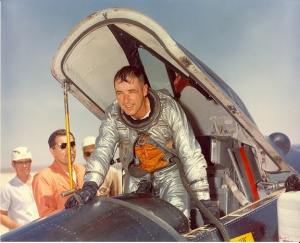
Bulova Accutron Astronaut
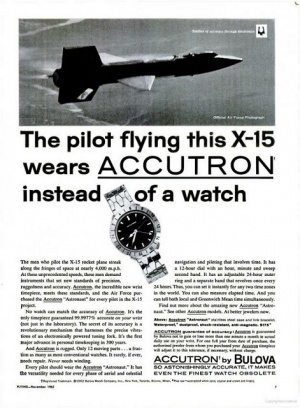
When the first Accutron tuning fork watches were released to the public in 1960 they were seen as nothing short of revolutionary. The Astronaut was (and still is) the ultimate expression of this extraordinary period in watch technology. The smooth sweep of the second hand, the soothing hum of the motor, the hidden crown, the flying saucer appearance all loudly proclaimed 'THE FUTURE IS HERE'. It was science-fiction brought to life for a cold-war generation.
The background - A SpaceView
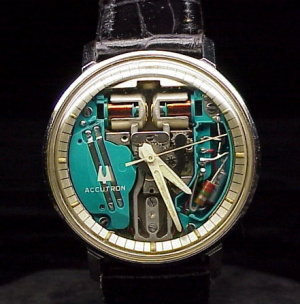
The Bulova Accutron was the world’s first fully electronic watch. Rolled out under worldwide scrutiny at the World’s Watchmaking Fair in Basel, Switzerland (now called Baselworld) in 1960, the watch incorporated a revolutionary new technology that utilized a 360-Herz tuning fork, powered by a one-transistor electronic oscillator, to drive the timekeeping functions rather than a traditional balance wheel. The brainchild of Bulova engineer (and Basel native) Max Hetzel, this technology ensured an oscillation rate of 360 times per second — nearly 150 times faster than that of a mechanical, balance-wheel-driven timepiece — and guaranteed an accuracy to just one minute per month. The Accutron was distinguished by its telltale humming instead of ticking, a sound generated by the vibrating tuning fork.
The first Accutron model, called Spaceview 214 and featuring its now-famous open dial showing off the high-tech movement, also deviated from traditional wristwatch design with its lack of setting stem and crown on the side of the watch; these elements were instead placed on the back of the case. The Accutron has been the cornerstone of Bulova’s portfolio ever since.
The Moon Connection
Bulova also lent its expertise to the U.S. government during the late-1960s Space Race with the Soviet Union. During its decades-long partnership with the National Aeronautics and Space Administration (NASA), Bulova helped outfit numerous satellite missions with Accutron timekeeping technology, starting with the Vanguard 1 in 1958. All timekeeping instruments, including instrument-panel clocks, aboard NASA’s manned spacecraft missions leading up to and including the legendary first Moon Walk on July 21, 1969, were equipped with Bulova Accutron tuning fork technology. (At the time, even NASA scientists could not know how a mechanical timekeeper would function in low-gravity conditions.) Of course, watch history buffs are well aware that it was the Omega Speedmaster Professional (now appropriately nicknamed the Moonwatch) that won the right to be official NASA watch and hence the first watch worn on the moon during the historic Apollo 11 mission in 1969. Fewer may realize that astronaut Buzz Aldrin also placed a Bulova Accutron timer in the Sea of Tranquility to help transmit critical data transmissions.
Genesis 1962 - The Astronaut
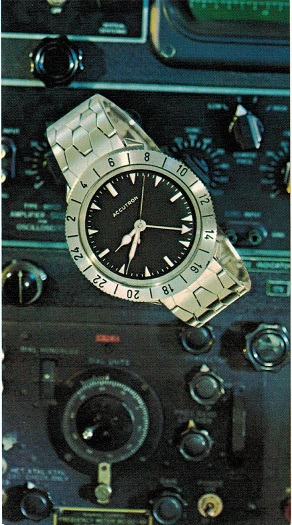
In 1962 Bulova produced the Astronaut, a 214-based GMT timepiece with a 24-hour rotating bezel, secondary 24-hour hand, and hack function. The Astronaut was initially developed by Bulova for the US space program, but ultimately found its greatest success in the consumer market.
The handset first used on the new all stainless steel Accutron GMT watch (which had yet to be named Astronaut) was lifted from the Bulova Timer Labs and was the Bulova Accutron Hand Set P/n WS-25 white spade Bulova had already been using on all their aerospace clocks and timers.
The first all stainless steel Accutron Astronaut, The 1962 Accutron Astronaut "A" variant "X-15" with factory original "Simple" dial & handset (Called "Regular" dial & handset in promotional materials) This is one of the rarest Accutron 214 watches of all time bar none! The 1962 stainless steel Accutron Astronaut used the Bulova handset P/N WS-25 that was used on clocks and timer switches made by the Bulova Timer Labs that were the first to use the Bulova p/n WS-25 handset starting in 1960, The "Simple" dial & P\N WS-25 handset is referred to by Bulova as a "Regular" (non-luminous) dial & handset in promotional materials in 1962 as shown on this 1962 Bulova dealers card.
https://i.postimg.cc/y6ZLcrk7/Regular-Dial-And-Hands.jpg
And as this 1962 factory handset list clearly shows the white spade handset on the list of the only handsets that were available during that time frame for the Accutron 214 movement and frankly if the handset isn't on this list then simply didn't exist or could not be used due to the unique ID tube size of the Accutron 214 movement, All other Bulova movement calibers handsets are incompatible with the Accutron 214 caliber movement and without exception could not be used on the 214 movement.
https://i.postimg.cc/kgntH22Y/image.jpg
The Accutron Astronaut M2 (stamped to rear and the year indication eg M2 = 1962, M3 = 1963 etc) was the first stainless steel Astronaut ever made. It's unclear if they were ever released for sale to the general public. The dial only says "Accutron" on it. The hands and markers are of white non-luminous paint.
Development of the Astronaut
Bulova released numerous cosmetic variants of the Accutron Astronaut and it seems that each Astronaut variant is designBulova released numerous cosmetic variants of the Accutron Astronaut and it seems that each Astronaut variant is designated with a single letter or what Bulova calls it's "Style Name". Historically, collectors have struggled to fit their strange-looking Astronaut into the confusing and woefully incomplete reference provided by the Complete Price Guide to Watches, the most well-known watch guide in the world. The guide lists three letter designations: Astronaut "A", "B", and "C", and list multiple cosmetic variations under each designation. From the designation scheme seen in actual Bulova ads, they confirm the existence of an Astronaut "C", "H", "J", "L", "M", "N", "O" and "T" all of which are cosmetically unique. From Bulova sales books they confirm the existence of an Astronaut "K". In the case of the Astronaut "O" and "T", and the "J" and "K" the only difference between the two variants is dial color. From an official Bulova crystal catalog the existence of a letter designation (Bulova Style Name) for an Astronaut "D" and an Astronaut "E" are confirmed and it also confirms the "Complete Price Guide to Watches" listing of the Astronaut "A", "B" and "C" as being correct. That brings the confirmed list of Astronaut letter designations (Bulova Style Names) to "A", "B", "C", "D", "E", "G", "H", "J", "K", "L", "M", "N", "O", and "T" !
UPDATE - and now for the first time ever from a 1965 newspaper ad the previously unknown Astronaut "G" has been confirmed !!!
Assembled here is a complete list of all known factory Astronaut variants, based on 15 years of research from Micah Mabelitini, SAM2, Accutronitis, and other reputable sources which now includes the latest up to date and confirmed information available.
Instead of adhering to Bulova's fragmented system, we present here an alternate classification, based on the bezel and dial types. If your Astronaut does not look exactly like a variant described here, it is likely that it is not completely original. Bulova did occasionally issue odd cosmetic variants of some watches, but such variants are rare and difficult to authenticate.
Under this classification system, all Astronaut variants fall under one of four families, hence referred to as Type 1, 2, 3 and 4. Type 1 includes all standard Astronaut variants, with the standard painted dial and standard bare-metal bezel. Type 2 includes all Astronaut variants with an enhanced (applied markers) dial and a standard bare-metal bezel. Type 3 includes the models with a day/night bezel, and Type 4 includes the Swiss models with black bezel.
There is a good bit of mix-and-match among Type 1 Astronaut variants. It is possible that other factory-produced dial/hand combinations exist within the range of known Type 1 variants. However, variants of Type 2, 3 and 4 are completely monolithic. If you have an Astronaut with an unspecified mix of features, such as a Type 3 bezel and a Type 4 dial, or Type 2, 3 or 4 Astronaut with spear-style hands or a luminous seconds hand, the watch is not factory original.
Take special note that hand color and applied marker color must always match case color and non-luminous hands with non-luminous dials/ luminous hands with luminous dials.
Bezel Variants
Standard Stainless Steel: Bare metal stainless steel with engraved black numerals and half-hour indices; used on USA and Swiss Type 1 variants.
Standard 14kt Solid Gold: Bare metal 14kt solid gold with engraved black numerals and half-hour indices; Filled and Solid Enhanced Type 2 variants
Standard 18kt Solid Gold: Bare metal 18kt solid gold with engraved black numerals and half-hour indices; Ultra Type 2 variants
Day/Night: Fully enameled bezel face with 12 hours of white and 12 hours of black; stainless steel only; used only on Type 3 variants.
Swiss: Fully enameled black bezel face; stainless steel only; used only on Swiss Type 4 variants.
Case Variants
USA Stainless Steel: Standard lugs, used with all USA stainless steel Astronaut Type 1 or 3 variants.
Swiss Stainless Steel: Standard lugs, used with all Swiss stainless steel Astronaut Type 1 or 4 variants.
14K Filled: Covered lugs, used only with the 14kt Gold Filled Enhanced Type 2 variants.
14K Solid: Covered lugs, used only with the 14kt Solid Gold Enhanced Type 2 variant.
18K: Standard lugs, used only with the 18kt Solid Gold Ultra Enhanced Type 2 variant.
Dial Variants
Simple: (Regular) Nearly identical to the standard dial but with no dots of any kind at the half-hour markers; may say 'Accutron', 'Bulova Accutron' logo at 12, or in late 1962/early 1963 may say 'Accutron' 12 'Astronaut' 6 on it, The factory black variation dials are of an early "1st gen" type and a late "2nd gen" type with the only difference between the two being the 1st gen (first dial used with the new all SS Astronaut) has no luminous paint over the hour markers and the 2nd gen does have luminous paint over the hour markers but neither has dots of any kind at the half-hour markers. The "Simple" factory black variation 1st gen dials have been confirmed to be used on the first stainless steel Astronaut M2 watches; available in silver, black. used only on first-year USA Type 1 variants.
Simple: (Luminous) Nearly identical to the standard dial but with luminous paint over the hour markers and no dots of any kind at the half-hour markers; may say 'Accutron', 'Bulova Accutron' at 12 or in late 1962/early 1963, available in silver, black. used only on first-year USA Type 1 variants.
USA Standard: (Luminous) Painted 'Accutron' logo at 12, luminous painted over the hour markers, luminous painted dots at the half-hour markers; may say 'Accutron' or 'Bulova Accutron' but always says 'Astronaut', available in black and silver, used only on USA Standard Type 1 variants
USA Enhanced: (Luminous) Applied "Accutron" logo at 12, Applied trapezoidal markers at 1, 2, 4, 5, 7, 8, 10, 11; available in black, silver and gold; applied markers match case color, used only on USA Enhanced Type 2 variants.
Ultra: (Luminous) Applied "Accutron" or "Bulova Accutron" logo, Applied diamond-shaped markers at 3, 6, 9; Painted 'Astronaut', available in gold only, used only on Ultra Enhanced Type 2 variants.
Day/Night: (Luminous) Applied Accutron logo; Applied arrow markers at all hour positions, Painted 'Astronaut', available in black, silver; used only on Type 3 variants.
Swiss Enhanced: (Luminous) Painted Bulova Accutron logo at 12, Painted "Swiss" at 6 or Painted "T Swiss T" at 6, luminous painted Applied rectangular hour markers, Painted 'Astronaut', available in black, cream; used only on Swiss Enhanced Type 4 variants.
Swiss Standard: (Luminous) Painted Bulova Accutron logo at 12, Painted "T Swiss T" at 6, luminous painted over the hour markers, luminous painted dots at the half-hour markers; Painted 'Astronaut'; available in black and silver; Swiss Type 1 variants.
Hand Variants
White Spade: (Regular) Non-Luminous Bulova Accutron Hand Set P/N WS-25 and used only on the early "1st gen" stainless steel Astronaut M2 Type 1 variant. not available on Type 2, 3 or 4.
White Spade: (Luminous) Luminous Bulova Accutron Hand Set P/N WRdS-25 and used only on the early "Mid Year" stainless steel Astronaut M2 Type 1 variant. not available on Type 2, 3 or 4.
Baton Point: Luminous hour and minute hands are non-tapering, with an arrow tip; used only on certain Type 1 variants. not available on Type 2, 3 or 4
Spear: Luminous hour and minute hands are wide and tapered, with an arrow tip; used on some Type 1 variants, and all Type 2 and 3 variants.
Fils Seconds: Certain variants of Type 1 Astronaut with the simple black dial. not available on Type 2, 3 or 4.
Luminous Seconds: Certain variants of Type 1 and Type 3 Astronaut include a luminous seconds hand. Luminous seconds is not available on Type 2 or 4 variants.
Square: Certain variants of Type 1 Astronaut is known to use a large, luminous square with a pointed tip minute hand.
Arrow: Certain variants of Type 1 Astronaut with baton point hands include a rare luminous arrow hour hand. arrow hour is not available on Type 2, 3 or 4 variants.
Square Pitched: (Swiss) luminous hour and minute hands are wide and non-tapering, with a flat tip. square pitched hands are only available on Swiss Type 4 variants.
Stick Seconds: (Swiss) Non-Cone Seconds hand are only available on Swiss Type 4 variants. not available on Type 1, 2, or 3.
Index Arrow GMT: 24 Hour hand, luminous arrow tip, USA and Swiss Type 1, USA Gold Type 2, and USA Type 3 variants, not available on Type 4 variants.
Goose Neck Index Arrow GMT: 24 Hour hand, luminous arrow tip, only available on Swiss Type 4 variants. not available on Type 1, 2, or 3.
Red Index Arrow GMT: 24 Hour hand, luminous arrow tip, USA Type 1 and 3 variants, not available on Type 2 and 4 variants.
Bracelet Variants
Only two bracelet styles are confirmed to have been used on the Astronaut: the Kreisler 'Coffin-Link' bracelet, JB Champion 'Bullet-Link' bracelet. Bracelet must match case material and have a signed clasp with the Accutron logo. First-year stainless steel Astronauts with the Kreisler 'Coffin-Link' bracelet can only be confirmed to be of the applied logo clasp type, The stainless steel Astronauts used the Kreisler 'Coffin-Link' bracelet starting with their introduction to the general public in very early 1962 until sometime in late 1963/early 1964, And starting in late 1963/early 1964 and on the JB Champion 'Bullet-Link' bracelet was used. The Ultra Enhanced 18kt Astronaut "C" is confirmed to have come with a Solid 18kt JB Champion 'Bullet-Link' Bracelet. It is currently unknown whether or not bracelet type was a distinguishing factor in Bulova's original designation system.
Band Variants
Note - The buckle's color must match the color of the bezel!
A leather band has been confirmed for the first time ever from a 1965 newspaper ad featuring the previously unknown Astronaut "G" ! It seems to be a slightly lower cost version of the Astronaut being sold in 1965, The Astronaut "G" with its factory install leather band cost $165.00 versus the Astronaut "H" being sold that same year and with its factory-installed bracelet costing $10.00 dollars more at $175.00.
Now also confirmed to have factory-installed leather bands are the Astronaut "D" Style# 26201 18kt solid gold and the Swiss Astronaut "letter designation unknown" Style# 21207.
Evolution by Year
1963
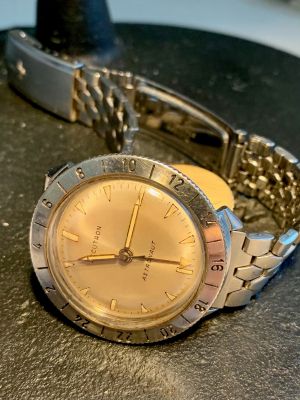
Bulova started making the all stainless steel Astronaut in 1962 and sometime around late 1962 / early 1963 they changed the first type of hands to the luminous hands which are the most commonly seen. At the same time luminous paint was added to the dial hour markers to match the luminous hands. Other than that one change to the dial it is exactly the same as the very first dial to be used in the all stainless steel 1962 Astronaut watches. Late 1963 Bulova added "Astronaut" to the dial and also added the large luminous dots in-between the now luminous hour markers. Stanless steel silver dials now also seen.
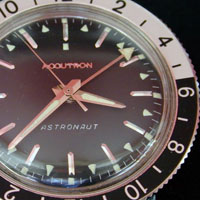
1964 Bulova name begins to appear on dial above Accutron.In rare cases below! The "bullet" bracelet introduced.
1965 Applied metal logo and hour indices appear on some dials. 24hr counter hand changes to clear the higher dial markers.
1968 All black 24 hour and black-white day night bezel options appear.
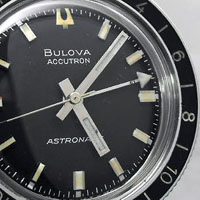
1970 Mark II version with square case and twin crown makes a dramatic departure from the original model
1977 The last of the 214 movements are made and the original Astronaut is no more
Credits
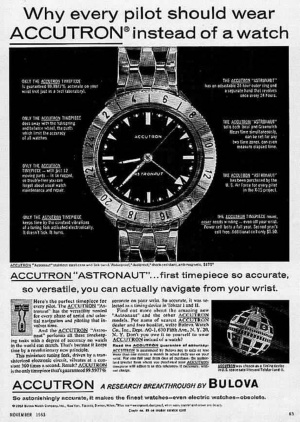
- https://www.watchtime.com/featured/the-history-of-bulova-through-10-milestone-bulova-watches/
- https://www.mybulova.com/watches/1962-accutron-astronaut-8039#comment-63369
- http://www.decadecounter.com/accutron/astronaut.htm
- https://accutronfacts.freeforums.net/thread/281/centers-white-spade-handsets-blue
- https://accutronfacts.freeforums.net/thread/279/complete-astronaut-variant-guide-updated
